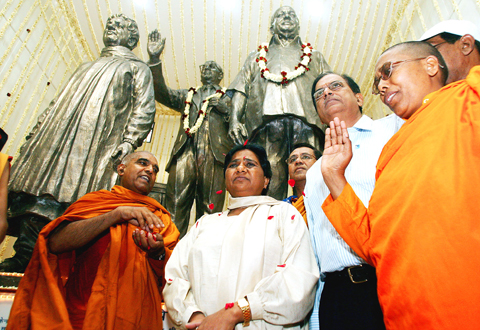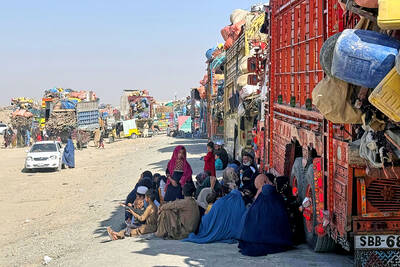India’s Supreme Court has forced low-caste political icon Mayawati to halt her statue-construction spree aimed at celebrating the heroes on the lowest rung of the country’s social ladder.
Mayawati, who leads the poverty-ridden northern state of Uttar Pradesh, has stirred huge controversy by spending hundreds of millions of dollars to build “statue parks” she says will boost the status of India’s lowest castes.
The pugnacious politician initially defied the court’s order last month to stop construction of Greek Parthenon-style memorials to political icons of the Dalits — those at the bottom of the ancient Hindu caste hierarchy.

PHOTO: AFP
But after the court warned that the state government was “playing with fire,” the 53-year-old, known as the “Dalit Queen,” ordered a halt on Friday to building and the construction sites fell silent at the weekend. The court order covers half a dozen sites being developed into memorials to leaders of the long-oppressed Dalits — the 160 million Indians who still face widespread oppression despite legislation outlawing discrimination.
Many of the monuments are to Kanshi Ram, founder of Mayawati’s Bahujan Samaj Party (BSP), B.R. Ambedkar who framed the Indian constitution and also of Mayawati — whose statues show her carrying her trademark handbag.
The court censured Mayawati for spending an estimated 26 billion rupees (US$537 million) on what critics have dubbed her “obsession” with building statues.
Uttar Pradesh is India’s most populous state where funds are badly needed for hospitals, schools and other public services.
Mayawati, who has used her caste to mobilize voter support and become India’s most important Dalit politician, has stirred opposition by changing land use rules, pouring concrete over green space and demolishing public buildings to create the memorials.
“Lifeless and insipid, they fail to move the spectator because they speak of nothing but their creator’s lust for grandeur,” columnist Amrit Dhillon wrote in the Times of India.
The top court said the state government could not “fritter away” public money on such memorials and promised to examine the “constitutional validity” of such memorials for political leaders using taxpayers’ money.
But the former school teacher, who has proclaimed her desire to be India’s first Dalit prime minister, has denied accusations that she is squandering public money.
She insists that the statues are meant to celebrate the contribution to India’s history of the Dalits.
“We may look at them in terms of aesthetics and cost,” but for many Dalits the statues are “symbols of empowerment,” said author Ajoy Bose, who wrote a biography of Mayawati.
“They are a pilgrimage site for many Dalits,” he said, adding, however, that if the Dalits believe Mayawati is not doing anything else for them “she will be in a lot of trouble.”
Mayawati said nobody has criticized the ruling Congress party, led by Sonia Gandhi, for spending vast sums on monuments to the Nehru-Gandhi dynasty which has governed India for most of the period since independence in 1947.
Had the Congress party spent money on “memorials for eminent persons belonging to the Dalit community, the BSP government would not have felt the need for the task,” she said recently.
Meanwhile, Uttar Pradesh opposition chief Mulayam Singh Yadav, ousted by Mayawati in 2007, has vowed to bulldoze the statues and memorials if he returns to power.

With much pomp and circumstance, Cairo is today to inaugurate the long-awaited Grand Egyptian Museum (GEM), widely presented as the crowning jewel on authorities’ efforts to overhaul the country’s vital tourism industry. With a panoramic view of the Giza pyramids plateau, the museum houses thousands of artifacts spanning more than 5,000 years of Egyptian antiquity at a whopping cost of more than US$1 billion. More than two decades in the making, the ultra-modern museum anticipates 5 million visitors annually, with never-before-seen relics on display. In the run-up to the grand opening, Egyptian media and official statements have hailed the “historic moment,” describing the

SECRETIVE SECT: Tetsuya Yamagami was said to have held a grudge against the Unification Church for bankrupting his family after his mother donated about ¥100m The gunman accused of killing former Japanese prime minister Shinzo Abe yesterday pleaded guilty, three years after the assassination in broad daylight shocked the world. The slaying forced a reckoning in a nation with little experience of gun violence, and ignited scrutiny of alleged ties between prominent conservative lawmakers and a secretive sect, the Unification Church. “Everything is true,” Tetsuya Yamagami said at a court in the western city of Nara, admitting to murdering the nation’s longest-serving leader in July 2022. The 45-year-old was led into the room by four security officials. When the judge asked him to state his name, Yamagami, who

DEADLY PREDATORS: In New South Wales, smart drumlines — anchored buoys with baited hooks — send an alert when a shark bites, allowing the sharks to be tagged High above Sydney’s beaches, drones seek one of the world’s deadliest predators, scanning for the flick of a tail, the swish of a fin or a shadow slipping through the swell. Australia’s oceans are teeming with sharks, with great whites topping the list of species that might fatally chomp a human. Undeterred, Australians flock to the sea in huge numbers — with a survey last year showing that nearly two-thirds of the population made a total of 650 million coastal visits in a single year. Many beach lovers accept the risks. When a shark killed surfer Mercury Psillakis off a northern Sydney beach last

‘NO WORKABLE SOLUTION’: An official said Pakistan engaged in the spirit of peace, but Kabul continued its ‘unabated support to terrorists opposed to Pakistan’ Pakistan yesterday said that negotiations for a lasting truce with Afghanistan had “failed to bring about a workable solution,” warning that it would take steps to protect its people. Pakistan and Afghanistan have been holding negotiations in Istanbul, Turkey, aimed at securing peace after the South Asian neighbors’ deadliest border clashes in years. The violence, which killed more than 70 people and wounded hundreds, erupted following explosions in Kabul on Oct. 9 that the Taliban authorities blamed on Pakistan. “Regrettably, the Afghan side gave no assurances, kept deviating from the core issue and resorted to blame game, deflection and ruses,” Pakistani Minister of